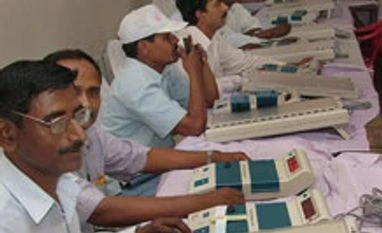A bench of justices A K Patnaik and Ranjan Gogoi passed the order on a petition by the State Election Commission for a direction to the government to provide adequate security personnel for the conduct of the polls scheduled for July 2.
The election body contended that it was not possible to hold violence-free polls in the prevailing circumstances as enough security personnel were not available.
Advocate Meenakshi Arora, appearing for the election commission, contended that the poll body was ready to hold the elections in more phases but security forces must be provided to it and even pleaded that the elections can be put off for some time.
She contended that the commission needed around 2,41,000 security personnel out of which 1,40,000 should be armed and rest unarmed.
The state government submitted that it wanted the elections to be held at any cost and said that the matter is being heard by the Calcutta High Court.
Advocates Amarendra Sharan and Somesh Jha, appearing for the state government, accused the election commission of not being interested in holding the polls and submitted that the Calcutta High Court is hearing the case on a regular basis.
The bench, however, was not convinced and said it would hear the case and posted it for June 28 for further arguments.
'If you want elections, then allow us to hear the case. What is your assessment of the statement made by the election commission before us,' the bench said, asking the government to respond to the election body's plea.
'List this matter on June 28 when the West Bengal government and the Centre through Ministry of Home Affairs will apprise this court as to how they propose to meet the requirements of forces mentioned in the order of May 14 of the high court as well as the communication of the Election Commission of May 14 and June 22,' the apect court bench said.
A division bench of the Calcutta High Court had on May 14 rejected the State Election Commission's order for 800 companies of central forces to man the panchayat polls, and directed that the elections be held in three phases and the process be completed by July 15.
Later on June 13, the high court had clarified its May 14 order, saying SEC would decide on the requirement of forces for the polls and the state would make the arrangements.
It would be the state government's discretion as to from where it would procure the forces - from other states or central forces, the high court had said.
In its May 14 order, the high court had also directed that the dates for the elections be notified by the state government in consultation with SEC.
It had also directed that names of remaining 134 observers, of the total of 400 asked for by SEC, would have to be provided by the state within three days.
The court, while not accepting SEC's contention that 800 companies of central armed police forces were required to hold the rural polls in West Bengal, had said that the state may procure forces from other states or the Centre, if necessary.
The court had also demarcated the 57,000-odd booths for the panchayat election into four categories -- highly sensitive, sensitive, less sensitive and normal. It had directed that two armed policemen and two unarmed constables would be provided for each booth in case of highly sensitive booths and two armed policemen only for each sensitive booth.
It had also ordered that under the less sensitive category, one armed policeman and one unarmed constable would be provided for each of the premise, which may house more than one booth.
Under the normal category, one armed police personnel would be provided per premises, the high court had directed.
The commission had moved the high court challenging the state's notification of panchayat elections in two phases, claiming that it was unilateral and seeking 800 companies of central forces was required for holding the rural polls in a free, fair and peaceful manner.
)